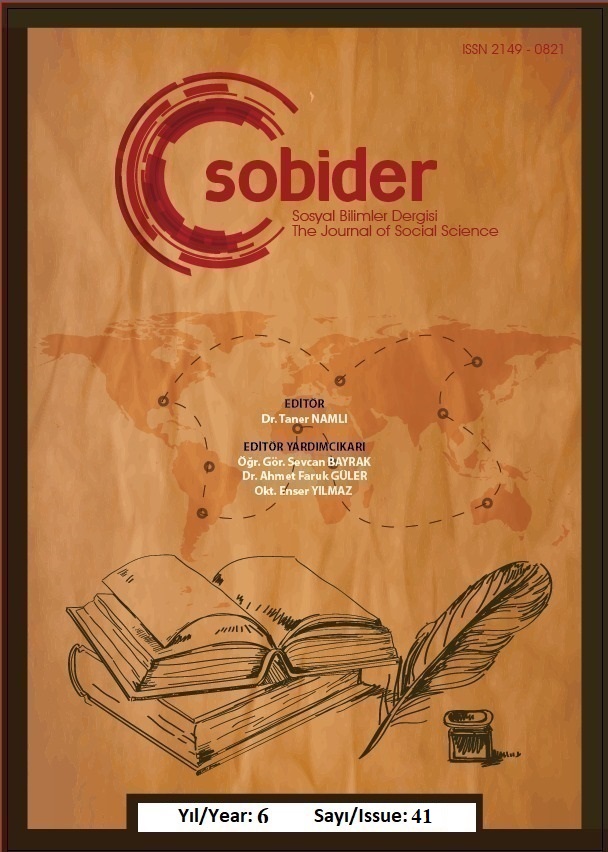Author :
Abstract
Bu çalışmanın amacı Türkiye’deki devlet ve vakıf üniversitelerinde siyaset bilimi ve kamu yönetimi/kamu yönetimi lisans programlarında çevre içerikli derslerin verilme düzeyini tespit etmektir. Böylelikle devlet üniversiteleri ve vakıf üniversiteleri arasında çevre içerikli dersler açısından karşılaştırma yapılması amaçlanmaktadır. Bu amaçla Türkiye’deki devlet ve vakıf üniversitelerinin web sayfaları üzerinden ders katalogları taranmıştır. Siyaset bilimi ve kamu yönetimi/kamu yönetimi lisans programlarında ekoloji, çevre kirliliği, çevre sorunları, çevre politikaları, sürdürülebilir çevre, çevre yönetimi, kentleşme ve çevre sorunları gibi çevre içerikli derslerin verilme düzeyleri araştırılmıştır. Bu çalışmanın Türkiye’deki devlet ve vakıf üniversitelerinde siyaset bilimi ve kamu yönetimi/kamu yönetimi lisans programlarının ders planları/ müfredatlarında uzlaşının sağlanması konusunda bilgi sunması beklenmektedir.
Keywords
Abstract
The aim of this study is to determine the level of courses that contains environmental education in the undergraduate programs of political science and public administration/public administration of public and private universities in Turkey. Thus, it is aimed to make comparisons between public universities and private universities in terms of environmental content. For this purpose, course catalogs on the web pages of public and private universities in Turkey are scanned. In the study, the level of giving enviromental content courses such as ecology environmental pollution environmental problems environmental policies, sustainable environment, urbanization and environmental problems in political science and public administration/public administration undergraduate programs were researched. It is expected to provide information on the provision of consensus about the course plans/curriculum of undergraduate programs of political science and public administration/public administration at public and private universities in Turkey by this study.
Keywords
- Adger, W. N. ve Benjaminsen, T. A., Brown, K. and Svarstad, H. (2001), “Advancing a Political Ecology of Global Environmental Discourses” , Development and Change, 32, 681–715.
- Clark, M. (2005), “Corporate Environmental Behavior Research: Informing Environmental Policy”. Structural Change ve Economic Dynamics, 16(3), 422-431.
- Culen, G. ve Mony, P. (2003), “Assessing environmental literacy in a non-formal youth program”, The Journal of Environmental Education, 34(4), 26-28.
- Erol, G. H. ve Gezer K. (2006), “ Prospective of Elementary School Teachers’ Attitudes Toward Environment and Environmental Problems”, International Journal Of Environmental and Science Education, 1 (1), 65 – 77.
- Goldman, D., Yavetz, B. ve Pe’er, S. (2006), “Environmental literacy in teacher training in Israel: Environmental behavior of new students”. Journal of Environmental Education, 38( 1), 3–22.
- Işıldar, Y. G. ve Yıldırım, F. (2008),”The Effectıveness of Envıronmental Educatıon on Envıronmentally‐ Sensıtıve Behaviours”, Education and Science, 33 (148), 13-25.
- Keleş, R., Hamancı, C. ve Çoban, A. (2009), Çevre Politikası, Ankara: İmge Kitapevi.
- Kricsfalusy, V., George, C. ve Maureen G. R. (2018), “Integrating Problem- And Project-Based Learning Opportunities: Assessing Outcomes of A Field Course İn Environment And Sustainability”, Environmental Education Research, 24(4), 593-610.
- Liefländer, A. K. ve Bogner, F. X. (2018), “Educational impact on the relationship of environmental knowledge and attitudes”, Environmental Education Research, 24(4), 611-624.
- Shackley, S. ve Wynne, B. (1995), “Global Climate Change: The Mutual Construction of an Emergent Science-Policy Domain”, Science and Public Policy, 22(4), 218-230.
- Vlek, C. ve Ste, L. (2007), “Human Behavior and Environmental Sustainability:Problems. Driving Forces, and Research Topics”, Journal of Social Issues, 63(1), 1-19.





